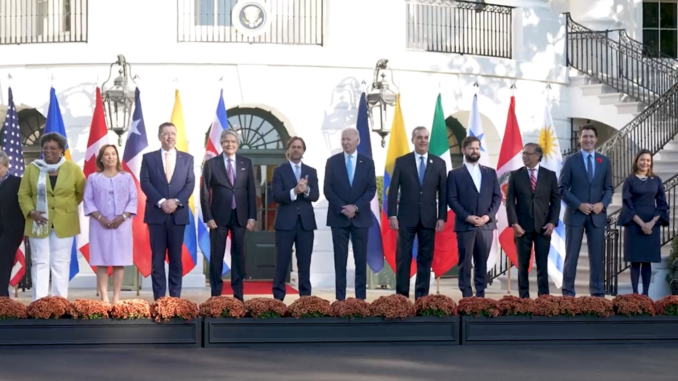
The Prime Minister, Justin Trudeau, on Friday concluded his participation in the inaugural Americas Partnership for Economic Prosperity (APEP) Leaders’ Summit in Washington, D.C., hosted by the President of the United States of America, Joe Biden, where 12 APEP partner countries from across the western hemisphere came together to work toward a more secure, healthy, and inclusive future for all.
During the APEP Leaders’ Summit, Canada made a series of joint funding announcements with APEP partner countries to continue building a sustainable and inclusive economy that benefits people across the region.
I’m in Washington today, along with leaders from 11 other countries, for the first-ever Americas Partnership for Economic Prosperity Leaders’ Summit. Stay tuned for updates – I’ll let you know how our meetings go, and I’ll keep you posted on the work we get done. pic.twitter.com/ebHJPiZVUa
— Justin Trudeau (@JustinTrudeau) November 3, 2023
Prime Minister Justin Trudeau announced, in partnership with the U.S. and Uruguay, the Government of Canada will invest $3 million to establish the Americas Partnership Accelerator Initiative, a new mechanism that provides entrepreneurs from marginalized communities the tools and training they need to succeed. This initiative will create a more innovative and diverse workforce, as well as build a more resilient, sustainable, and competitive economy.
Canada remains committed to continue fighting climate change and fostering an economy that works for everyone. Earlier this year, the Government of Canada partnered with the Inter-American Development Bank Group (IDB) and committed $5 million to promote the use of nature-based solutions in Latin America and the Caribbean. Combined with other announcements made by our partners, including a US$10 million contribution from the U.S., the Government of Canada will continue helping countries in Latin America and the Caribbean build climate-resilient ecosystems and achieve their biodiversity priorities by providing opportunities to marginalized communities, including women.
The Latin American and Caribbean region currently hosts 18 million refugees, asylum seekers, and displaced and stateless persons, as well as 15 million migrants. Since June, Canada has continued to welcome migrants and refugees from the Western Hemisphere. As we face increasing global uncertainty, the Government of Canada remains committed to support the world’s most vulnerable people who seek our protection. Canada will contribute US$10 million in IDB’s Grant Facility for Migration toward infrastructure and social services to help stabilize refugee and migrant-hosting communities. This will improve access to basic necessities such as housing, clean water, education, and health care. APEP partner countries will be the primary beneficiaries of this investment as they host most of the migrants and refugees in the region.
Throughout their meetings, APEP leaders discussed their shared commitment to advance regional growth and strengthen supply chain resiliency in critical sectors. Canada underscored the importance of the rules-based international order, and working together to build a more secure, stable, and prosperous future – including for people in Haiti, Ukraine, and the Middle East.
At the APEP Leaders’ Summit, the leaders issued a joint declaration to highlight priorities and inform APEP’s commitment to work with partners to build an economy that works for people in the region.
Quote
“When the democracies in the hemisphere unite to advance our shared priorities – from fighting climate change to driving economic growth, and to creating good, quality jobs – we pave the way for a more inclusive, sustainable, and prosperous future for all. I look forward to continuing to work with my fellow APEP partners to unlock more prosperous opportunities for people in Canada and in the region.”
Quick Facts
- The APEP Leaders’ Summit is a historic initiative that creates a framework for regional co-operation to foster competitiveness, resilience, shared prosperity, and inclusive and sustainable investment. It aims to unleash the Western hemisphere’s full economic potential including boosting competitiveness, building more resilient regional supply chains, creating quality jobs, combating climate change, and reinvigorating our hemisphere’s economic institutions.
- The 12 APEP partner countries are:
- Barbados
- Canada
- Chile
- Colombia
- Costa Rica
- Dominican Republic
- Ecuador
- Mexico
- Panama
- Peru
- United States
- Uruguay
- The Inter-American Development Bank Group is the largest source of multilateral development financing for Latin America and the Caribbean.
- The Canada-United States-Mexico Agreement (CUSMA) establishes one of the largest free trade regions in the world, generating economic growth and helping to raise the standard of living for the people of all the partner countries.
- Canada and the United States share the longest and most secure border in the world, which approximately $3.4 billion worth of goods and services cross daily in 2022.
- In 2022, Canada was the United States’ largest trading partner in goods and services.
- Canada has longstanding ties and robust relationships with Caribbean countries, including our partnership on development challenges and regional security. Our shared values include democracy, human rights, and the rule of law with our Commonwealth, Francophonie, and other partners.
- Canada shares strong connections with countries and peoples of Latin America, including people-to-people ties, shared values, trade and investment, student exchanges, and tourism.
- In the Los Angeles Declaration on Migration and Protection, Canada joined 19 other countries to reaffirm their commitment to safeguarding the safety, dignity, human rights, and fundamental freedoms of all migrants, refugees, asylum seekers, and displaced and stateless persons regardless of their migratory status. This includes working together to achieve safe, orderly, and regular migration in the region.
- Since 2015, Prime Minister Trudeau has met with numerous APEP leaders during several domestic and international events and meetings, to discuss social, economic, and security issues.
SOURCE PMO

Leave a Reply